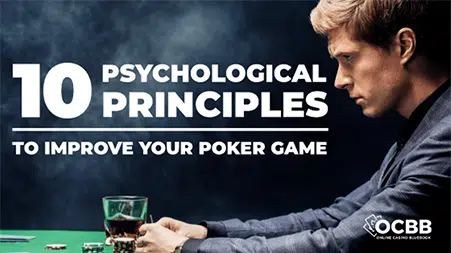Psychology is a fascinating field of study with a wide range of aspects to explore. One of those aspects is performance and what factors can affect or better our ability to perform at specific skills and tasks. Humans and the way we think and behave is far from cut and dry. But where does someone begin? Sports psychology is often used by athletes to help improve their performance, but what about poker players?
Whether you’re a novice or casual player or someone who is trying to play poker at a pro-level, here are some principles associated with psychology, you can try to improve your strategy.
1. Willingness To Learn
We’ve all met that poker player who is overly confident and sees no reason to grow and improve. They win often, and they see nothing wrong with their strategy. Either they are extremely lucky, or they know the game of poker well enough to keep winning.
Not only does being open to growth make you more humble, but you’re likely to improve your poker strategy just by having that willing to learn. Admitting that you don’t know everything there is to know about poker will ultimately open yourself up to more knowledge about the game.
2. Change and Use What You Already Know
Similar to being open to change, it’s always a good idea to re-evaluate what you know about poker and see what needs to change. Are you in a dry spell of winning or just aren’t getting much out of the game? There’s a good chance that you need to re-examine what you know about the game. It’s also an excellent idea to take an “inventory” of what you already know and figure out what you want to learn.
The best way to do this is to keep a journal of your short term and long term goals. And remember, it’s important that you aren’t too hard on yourself. Making mistakes is part of the change, and change leads to growth.
3. Learn From The Masters
Just like admitting that you might not be as good of a player as you think you are, it can be challenging to let someone show you the ropes or offer some tips. If a pro poker player gives you some free advice, take it. There’s nothing wrong with accepting it.
Take the free information and see if it works with your style of playing and thinking. Not all advice will work for you, but it is beneficial to remain humble. Learn from others who may have already made the mistakes you have and who have found possible solutions. There’s no need for you to do all the work on your own.
4. Practice
Unless you’re a poker savant, you need to practice to improve your poker strategy. Fortunately, practicing something that you enjoy is fun. You play as much as you can, learn from your gains and losses, and keep on practicing. Practicing is essential in mastering your craft. It also strengthens your mind, your ability to focus, and regulate your emotions. These are the things that make a smart and strong player.
5. Set Goals
If you want to improve your strategy, you’re going to have to put in a little work. Not only should you be open to learning more about poker strategy, but you need to be committed to improving. Setting goals can help you stay motivated to improve your game.
As mentioned once before, an easy way to keep track of your goals is by keeping a journal. It keeps you on track by having a place to refer back to when you start to feel lost or frustrated. The journal will help you remain focused on your goals and help keep your mind and emotions stable.
6. Get Creative
There are no strict rules on how to improve your poker strategy. Some players grow with increased gameplay while others prefer to read books, binge on You-Tube videos, or even watch movies with some classic poker scenes. Playing poker at online casinos can also help you practice or try out new techniques. You have the flexibility to play at all hours in the environment that best suits you.
7. Don’t Be Afraid To Make Mistakes
It’s not uncommon, in many areas of life, to fear making mistakes. Regardless if you’re an expert poker player or just a beginner poker player, you’re likely to make a mistake that may cost you the game. Rather than focusing on defeat, see it as a learning experience. You can also see it as a way to improve your strategy for your next game.
It’s essential to train the brain not to focus on the negatives. Instead, focus on the positive and finding other possible solutions. This will help keep you in this forwarding-thinking mental state where growth and change can manifest.
8. Don’t Spend The Whole Game “Psyching” Players Out
Some poker players swear by “distracting” other players with chit-chat, while others think that silence is powerful. You’re more likely to improve your strategy when you focus on the game rather than playing mind games with others. Do what feels natural to you. Don’t do anything that feels forced or will result in getting your head out of the game.
9. Avoid Letting Others Get In Your Head
As you try to focus on your strategy, you might find that other players are distracting. Maybe it’s apparent that they are playing mind games or they’re so good at holding a conversation that you’ve forgotten your next move. Poker is a social game in many ways, but it’s also a “one person for themselves” kind of game, don’t feel obligated to engage as you focus on your game.
It’s ok and even necessary for some to ignore those types of conversations. It’s similar to a boxer throwing a jab at you. Learn to defend yourself. And in the game of poker, this sometimes means remaining silent.
10. Be Optimistic
Similar to being open to learning, your poker strategy may improve if you become a more optimistic player. Optimism can carry you through the rough losses and give you the energy and motivation to keep going. If you believe that you are capable of winning and have an optimistic view of poker, there’s a higher chance that your strategy will improve, and you’ll end up winning sooner than later.
Having a positive outlook on things will help you keep your head in the game. And not only will they work towards improving your poker strategy and playing skills, but you may even start to see how they can help you in your everyday life.


